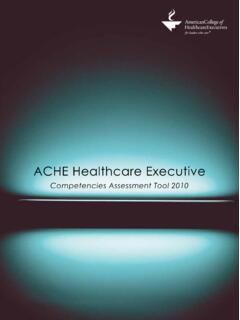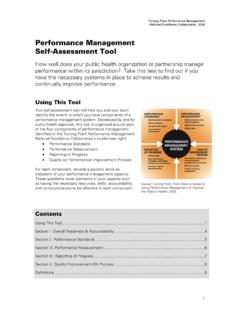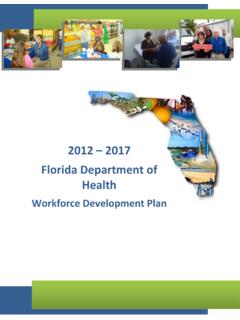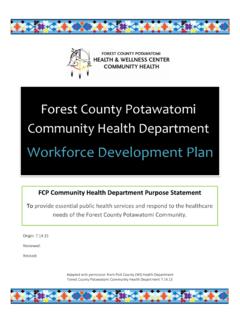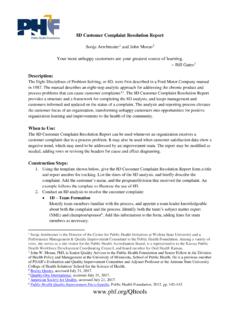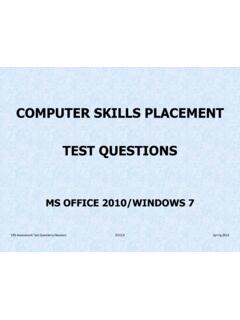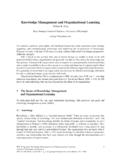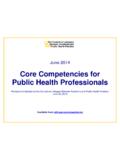Transcription of Competency Assessment - PHF
1 Competency Assessment Tier 1 Public Health Professionals 2014 Version Adapted by the Public Health Foundation from an Assessment developed by Janet Place, MPH, University of North Carolina (now at the University of South Carolina). Provided by the Council on Linkages Between Academia and Public Health Practice. May be modified as needed. Technical Note: This Assessment was designed for use with Adobe Acrobat/Reader. Scoring and other functions may not operate properly in other PDF viewers. To use the Assessment , download and save this PDF form before entering your scores. Competency Assessment for Tier 1 Public Health Professionals1. 2014 Version Introduction The Core Competencies for Public Health Professionals (Core Competencies) are a consensus set of foundational skills for the broad practice of public health, as defined by the 10 Essential Public Health Services. The Core Competencies are organized into eight skill areas or domains that cut across public health disciplines.
2 The purpose of this Assessment is to help you explore your level of competence within these eight domains. A Competency is any knowledge or skill of an individual or organization that has been shown to cause or predict outstanding performance. A collection of competencies makes up a behavioral roadmap that is directly related to both individual and organizational performance. By assessing your level of knowledge or skill for each Competency statement described, you will be able to prioritize your learning time to focus on those areas that are most important to you and to concentrate where the need for training and learning may be greatest. How to Complete This Competency Assessment The Competency Assessment should take about 20 minutes to complete. It is divided into the following eight domains: Analytical/ Assessment Skills Policy Development/Program Planning Skills Communication Skills Cultural Competency Skills Community Dimensions of Practice Skills Public Health Sciences Skills Financial Planning and management Skills Leadership and Systems Thinking Skills 1) Read each Competency statement listed within a domain.
3 2) In each domain, and for each Competency statement, think about the level at which you are currently able to perform the skill. Then rate your level of proficiency on each Competency statement by selecting the number on the continuum from None (1) to Proficient (4) that best describes your self-reported level of expertise for that statement. Note: The Competency statements listed in each domain should be interpreted as broadly as possible to apply to your position and principal setting of employment. In the example below, you would select number 4 for Proficient if you think you are excelling at this Competency or select 1 for None if you feel you need a great deal of improvement. 1. Tier 1 Front Line Staff/Entry Level: Tier 1 competencies apply to public health professionals who carry out the day-to-day tasks of public health organizations and are not in management positions. Responsibilities of these professionals may include data collection and analysis, fieldwork, program planning, outreach, communications, customer service, and program support.
4 1. Example: To what degree are you able to effectively describe factors affecting the health of a community ( , equity, income, education, environment)? 1 = None I am unaware or have very little knowledge of the skill 2 = Aware I have heard of, but have limited knowledge or ability to apply the skill 3 = Knowledgeable I am comfortable with my knowledge or ability to apply the skill 4 = Proficient I am very comfortable, am an expert, or could teach this skill to others 3) At the end of each domain there is a place to write any comments you have. For example, if you feel like an expert but may still want training or learning opportunities in a particular skill, please enter your comments in the comments section. You may also want to share this Assessment with your supervisor, colleagues, or others and ask them to add comments as well. These comments may be helpful to you and your supervisor in planning for your professional development.
5 4) After you have entered your responses for each domain, the sum of your scores will appear in the column next to Total Score. Your average score will also appear in the column next to Average Total and in the corresponding row of the Your Results section at the end of the Competency Assessment . 5) Review your results and follow the guidance offered in the Interpreting Your Results section to determine your next steps. 2. Analytical/ Assessment Skills 1 = None I am unaware or have very little knowledge of the skill 2 = Aware I have heard of, but have limited knowledge or ability to apply the skill 3 = Knowledgeable I am comfortable with my knowledge or ability to apply the skill 4 = Proficient I am very comfortable, am an expert, or could teach this skill to others To what degree are you able to effectively . 1 Describe factors affecting the health of a community ( , equity, income, education, environment).
6 - 2 Identify quantitative and qualitative data and information ( , vital statistics, electronic health records, transportation patterns, unemployment rates, community input, health equity impact - assessments) that can be used for assessing the health of a community 3 Apply ethical principles in accessing, collecting, analyzing, using, maintaining, and disseminating data and information - 4 Use information technology in accessing, collecting, analyzing, using, - maintaining, and disseminating data and information 5 Select valid and reliable data - 6 Select comparable data ( , data being age-adjusted to the same year, - data variables across datasets having similar definitions). 7 Identify gaps in data - 8 Collect valid and reliable quantitative and qualitative data - 9 Describe public health applications of quantitative and qualitative data - 10 Use quantitative and qualitative data - 11 Describe assets and resources that can be used for improving the health of a community ( , Boys & Girls Clubs, public libraries, hospitals, faith- - based organizations, academic institutions, federal grants, fellowship programs).
7 12 Contribute to assessments of community health status and factors influencing health in a community ( , quality, availability, accessibility, - and use of health services; access to affordable housing). 13 Explain how community health assessments use information about - health status, factors influencing health, and assets and resources 14 Describe how evidence ( , data, findings reported in peer-reviewed literature) is used in decision making - 3. Total Score (Add all scores and enter total here) Average Total (Divide the Total Score by 14 and enter the result here and into the corresponding row of the Your Results section). Comments: 4. Policy Development/Program Planning Skills 1 = None I am unaware or have very little knowledge of the skill 2 = Aware I have heard of, but have limited knowledge or ability to apply the skill 3 = Knowledgeable I am comfortable with my knowledge or ability to apply the skill 4 = Proficient I am very comfortable, am an expert, or could teach this skill to others To what degree are you able to effectively.
8 1 Contribute to state/Tribal/community health improvement planning ( , providing data to supplement community health assessments, - communicating observations from work in the field). 2 Contribute to development of program goals and objectives - 3 Describe organizational strategic plan ( , includes measurable objectives and targets; relationship to community health improvement - plan, workforce development plan, quality improvement plan, and other plans). 4 Contribute to implementation of organizational strategic plan - 5 Identify current trends ( , health, fiscal, social, political, environmental). - affecting the health of a community 6 Gather information that can inform options for policies, programs, and services ( , secondhand smoking policies, data use policies, HR - policies, immunization programs, food safety programs). 7 Describe implications of policies, programs, and services - 8 Implement policies, programs, and services - 9 Explain the importance of evaluations for improving policies, programs, - and services 10 Gather information for evaluating policies, programs, and services ( , outputs, outcomes, processes, procedures, return on investment).
9 - 11 Apply strategies for continuous quality improvement - 12 Describe how public health informatics is used in developing, implementing, evaluating, and improving policies, programs, and services - ( , integrated data systems, electronic reporting, knowledge management systems, geographic information systems). Total Score (Add all scores and enter total here) Average Total (Divide the Total Score by 12 and enter the result here and into the corresponding row of the Your Results section). 5. Comments: 6. Communication Skills 1 = None I am unaware or have very little knowledge of the skill 2 = Aware I have heard of, but have limited knowledge or ability to apply the skill 3 = Knowledgeable I am comfortable with my knowledge or ability to apply the skill 4 = Proficient I am very comfortable, am an expert, or could teach this skill to others To what degree are you able to effectively . 1 Identify the literacy of populations served ( , ability to obtain, interpret, - and use health and other information ; social media literacy).
10 2 Communicate in writing and orally with linguistic and cultural proficiency ( , using age-appropriate materials, incorporating images) - 3 Solicit input from individuals and organizations ( , chambers of commerce, religious organizations, schools, social service organizations, hospitals, government, community-based organizations, various - populations served) for improving the health of a community 4 Suggest approaches for disseminating public health data and information ( , social media, newspapers, newsletters, journals, town hall - meetings, libraries, neighborhood gatherings). 5 Convey data and information to professionals and the public using a variety of approaches ( , reports, presentations, email, letters) - 6 Communicate information to influence behavior and improve health ( , use social marketing methods, consider behavioral theories such as the - Health Belief Model or Stages of Change Model).
